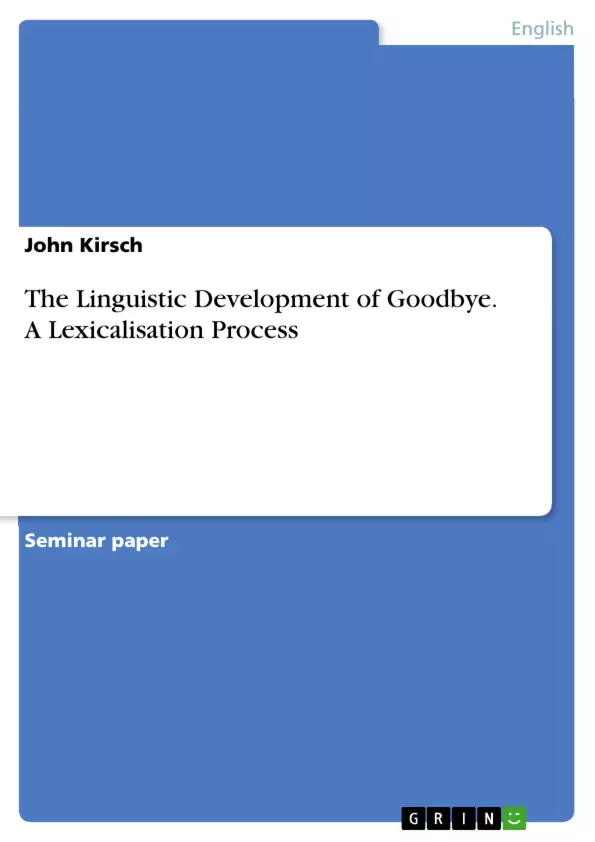There is no language on earth that did not undergo several major or minor changes in the course of time. The English language of course, is no exception and has changed both in grammatical and lexical fields. In modern days, it is taken for granted that people use certain words or phrases to end a conversation, which as a matter of fact, is not a new phenomenon to be observed. It would as much have been considered impolite back then as it is today, not to follow this path. One word that even young learners of English have integrated in their language use of today is the word goodbye. Even though many prefer to use the shortened form bye, the longer goodbye is still very common. But what many English speakers do not know is the fact that, in earlier times goodbye was associated with a religious blessing, which is a shortened form of a former farewell, called God be with you and was used in many texts in the time of the Early Modern English period.
Inhaltsverzeichnis (Table of Contents)
- Introduction
- Language Change and Lexicalization
- Methodology
- The Development of Goodbye
- Goodbye and Construction Grammar
- Conclusion
- References
Zielsetzung und Themenschwerpunkte (Objectives and Key Themes)
This paper examines the lexical development of the word "goodbye" from its origins in the 15th century to its modern form. It explores the process of lexicalization, analyzing the historical changes in the word's form and meaning through an investigation of its etymology and occurrences in the Early English Books Online (EEBO) corpus. The paper also examines the impact of "Construction Grammar" on the understanding of this lexical development.
- Lexicalization as a process of language change
- The historical development of the word "goodbye"
- The role of "Construction Grammar" in understanding lexical change
- The relationship between historical language use and contemporary language
- The influence of religious language on modern English vocabulary
Zusammenfassung der Kapitel (Chapter Summaries)
The introduction sets the stage for the paper by establishing the context of language change, particularly in relation to lexicalization. It highlights the importance of understanding historical language development and introduces the specific focus on the word "goodbye."
The second chapter delves into the concept of language change and lexicalization. It discusses different perspectives on lexicalization, emphasizing the process of fusion and unification as crucial factors in the evolution of words.
Chapter 3 outlines the methodology employed in the paper, emphasizing the use of the EEBO corpus for analyzing the historical occurrences of the word "goodbye" and its predecessors. It also mentions the consultation of the Oxford English Dictionary and relevant scholarly works.
Schlüsselwörter (Keywords)
The primary keywords and focus topics of this text include lexicalization, language change, historical linguistics, etymology, Early Modern English, "God be with you," "goodbye," Construction Grammar, and diachronic pragmatics. The paper uses these concepts to analyze the development of a specific word and its broader implications for understanding the evolution of language.
Frequently Asked Questions
What is the historical origin of the word "goodbye"?
The word "goodbye" originated in the 15th century as a religious blessing, shortened from the phrase "God be with you."
What does the term "lexicalization" mean in linguistics?
Lexicalization is the process of language change where a sequence of words or a phrase evolves into a single new word with a specific meaning.
How was the development of "goodbye" researched?
The development was analyzed using the Early English Books Online (EEBO) corpus and the Oxford English Dictionary to track historical occurrences.
What is the role of Construction Grammar in this study?
Construction Grammar is used as a framework to understand how the linguistic structure of the original blessing fused into the modern lexical unit.
Is the shortened form "bye" also part of this linguistic evolution?
Yes, the paper acknowledges that while "goodbye" is common, the further shortened form "bye" is a prevalent part of modern English language use.
Why did the religious association of the phrase disappear?
Through the process of lexicalization and phonetic reduction, the explicit reference to "God" was obscured, turning the blessing into a standard social formula.
- Arbeit zitieren
- John Kirsch (Autor:in), 2019, The Linguistic Development of Goodbye. A Lexicalisation Process, München, GRIN Verlag, https://www.grin.com/document/1060148



